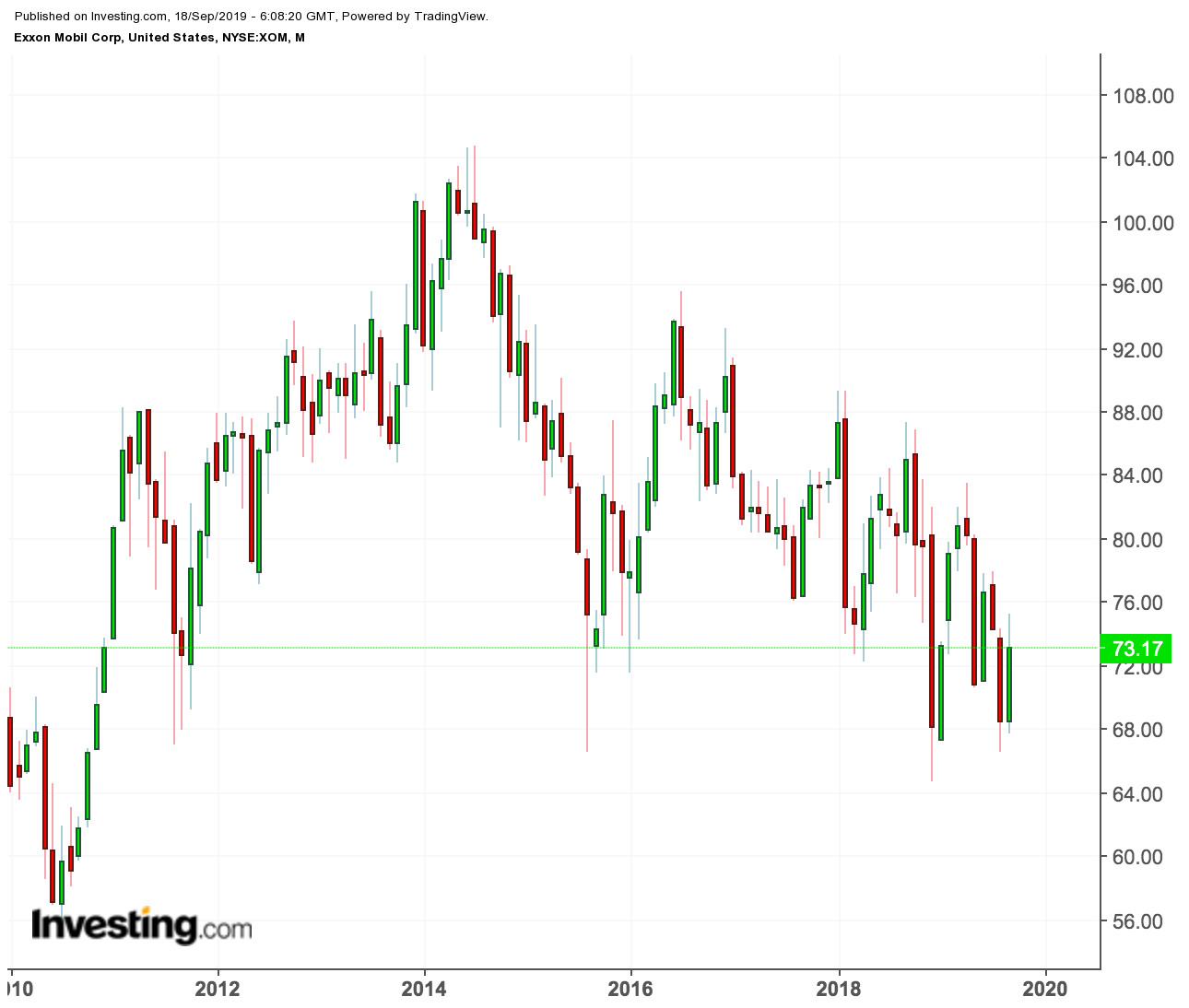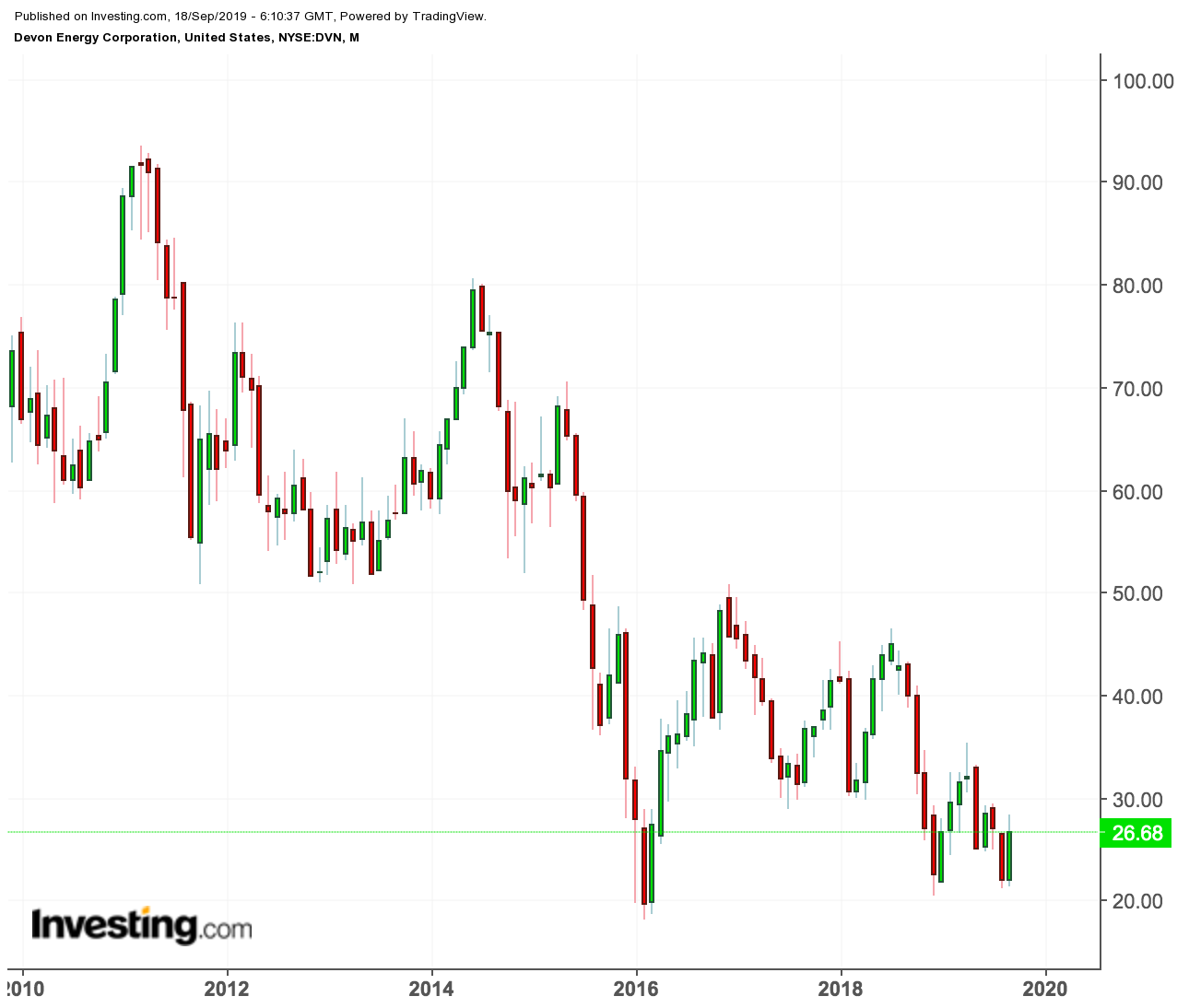Is now a good time to buy oil stocks? The sharp escalation in geopolitical tensions in the Middle East following an attack on Saudi Arabian oil facilities, and then a $12 a barrel spike in oil prices in a single day make this a tempting bet.
However, no one can predict where oil will be trading in a month's, or in six-month's time. Because of the volatile nature of energy markets, betting on oil stocks just because oil is trading higher isn’t a wise move. The gains of today could be wiped out quickly, bringing oil shares down with them.
But for those who want to keep some exposure to oil stocks in their portfolios, the best way to go about it is to buy diversified companies with a good history of paying dividends. Stocks like these can help investors weather the oil downturn better than the pure oil plays and, of course, will see a good upside move if oil continues to go higher.
Below are two top energy stocks that fit nicely into this strategy.
1. Exxon Mobil: Solid Cash Flows
If you want diversification in the oil and gas space, Exxon Mobil Corp (NYSE:XOM) is your best bet.
The company has impressive scale in everything from drilling to refining to the U.S. shale region. And while the stock is unlikely to produce massive gains for investors, it remains a top pick for long-term energy bulls.
The multinational oil and gas giant has also taken a forward-looking approach to improving its growth outlook, diverging from other large producers that are trying to stabilize their shares by cutting back on major spending.
Exxon's CEO, Darren Woods, believes the oil industry needs a significant injection of fresh investment to meet the new challenges it faces and has embarked on a $230 billion plan to revitalize the company, targeting drilling opportunities around the world.
These include shale wells in West Texas, natural gas export facilities in Papua New Guinea, a string of major discoveries in the South American nation of Guyana, and developments in Mozambique and Brazil.
Trading at $73.17 at yesterday's close, XOM shares have gained about 7% in 2019 and offer an annual dividend of $3.48 a share, with a yield of over 4.7%. With solid cash flows and a diversified portfolio of assets, Exxon Mobil is well-placed to benefit from a possible spike in prices.
2. Devon Energy: Sharp Focus on Growth
We like Oklahoma City-based Devon Energy (NYSE:DVN) stock to play on U.S. oil strength. The company is transforming its business structure to make it a pure shale producer and has made returning excess cash to investors its key priority.
As part of its push to become a shale-focused growth company, Devon has offloaded more than $30 billion assets over the past few years. Early in 2019, Devon sold its Canadian oil-sands business for $2.8 billion to Canadian Natural Resources Ltd (NYSE:CNQ). It is also planning to sell Barnett Shale gas assets in north Texas to focus on the high-return U.S. oil business.
"The combination of selling higher-cost assets and bringing online new lower cost production, along with our commitment to at least $780 million in annual cost-reductions, is expected to drive down per-unit cash costs more than 20% by 2021,” according Jeff Ritenour, executive vice president and chief financial officer.

According to Devon estimates, the producer can grow its U.S. oil production at a mid-teens annual rate while generating positive cash flows if oil trades at $46 a barrel and more.
Devon plans to return excess money to shareholders through dividend hikes and aggressive share buybacks. The company has hiked payouts to investors by 50% over the last two years, and increased its share buybacks to $5 billion.
Once completed, this massive share repurchase plan will reduce the company’s outstanding shares by 30%. Oil investors love this combination, where companies can be cash-flow positive and have a strong bias for rewarding their investors with dividends. Trading at $26.68 at yesterday's close, Devon shares have gained over 18% this year. The company pays $0.36 a share annual dividend with an annual yield of 1.28%
Bottom Line
Myriad short-term factors play pivotal roles in deciding the direction of oil markets. But if your investment horizon is long-term, the key is to focus on the companies that are able to survive the worst economic downturns and still deliver long-term value. We think both Devon and Exxon Mobil fit the bill.
